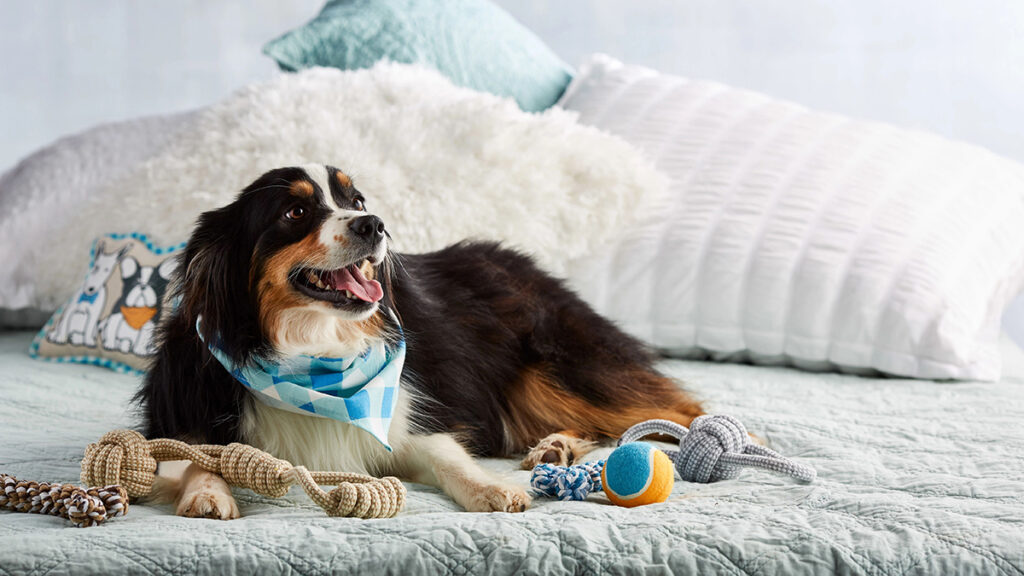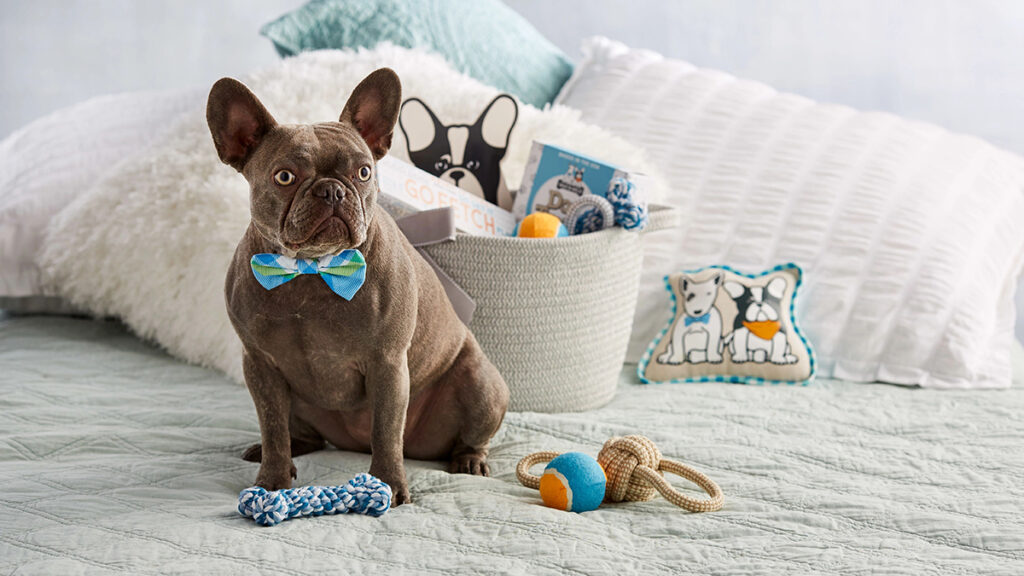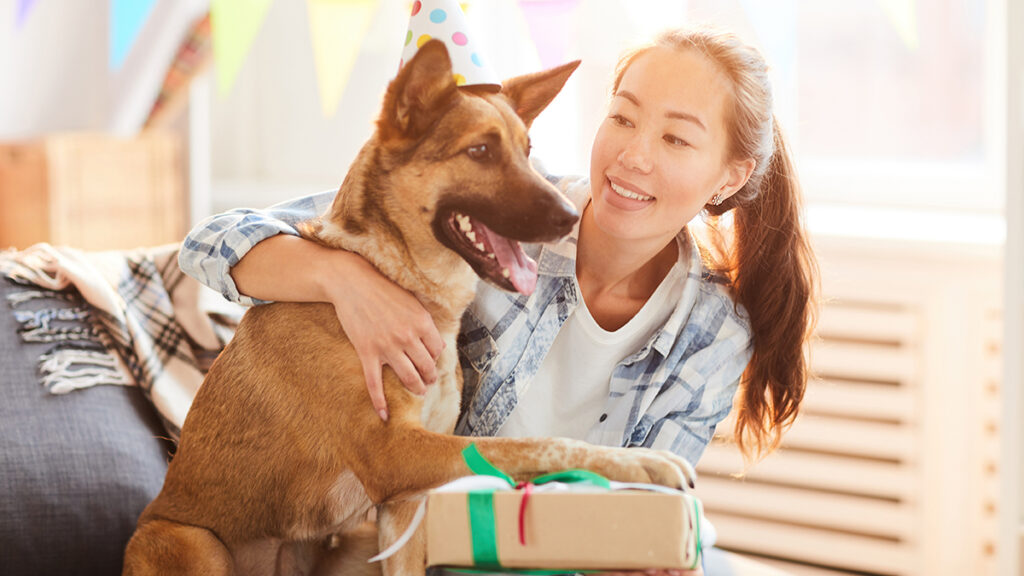Psychology Behind Buying Gifts for Your Pets
Why a present for your four-footed or feathered family member is good for both of you.
Sep 15, 2022

I'm not a fan of dressing pets up in silly costumes. It's mostly just a kick for the owners, imposing a human pastime on animals — and I don't think the animals like it. As Dr. Nancy Dunkle, founder of Exclusively Cats Veterinary Hospital in Medford, New Jersey, noted to PetCoach, “I've never seen a cat wearing a costume or clothing that looked happy per his facial and body language."
But another human-pet activity that traditionally stays among humans is gaining in popularity — buying gifts for a pet — and for good reason: Both humans and pets like it and benefit from it, and it brings them closer together. I'm not talking about the usual perfunctory treat reward for good behavior but making more of a production of it, say wrapping a gift up in a box with ribbons and bows, and presenting it to Fido, the same way we give our friends and family gifts on birthdays and at Christmas.
If this sounds extreme, did you know that, according to a PetFinder.com poll, 63% of dog owners and 58% of cat owners give their pets Christmas presents? About 40% of cat and dog owners even hang stockings for their pets, and, overall, Americans spend $5 billion annually on holiday gifts for pets.
Turns out, there are many good reasons to follow their lead.

The psychological benefits to you
Numerous studies have shown that giving presents to someone benefits both the giver and recipient psychologically, and often the giver feels even better than the recipient. Research also shows that giving your pet a gift lifts your mood as well.
A 2007 study by Virginia Commonwealth University found that people who give their pets gifts do it with the conscious aim of making the animals happy and improving their comfort and care. However, the study also revealed the subconscious self-directed rewards of giving, since, unlike human gift recipients, pets can't directly give gifts back.
“When you're giving to another person, you have this pressure of reciprocity, but it's not there with a pet," noted study coauthor Tracy Ryan, formerly an associate professor of advertising research at Virginia Commonwealth. “It shows that a lot of the pleasure is in the giving."
“However, it's not really true that pets don't give back," says Dr. Ellen Langer, a professor of psychology at Harvard University. “In general, the more I give to my dog, for example, the more loving the dog is to me, so there is reciprocity of a different sort."
A 2021 study shows that we may actually derive more psychological benefits from giving gifts to our pets than we do giving gifts to fellow humans.
A research team led by Michael White in the Columbia Business School at Columbia University sought to find out if we gain as much happiness giving a gift to a dog as we do giving gifts to ourselves or to another person.
In the first part of the experiment, they asked 159 pet owners to remember a time when they spent money on one of three recipients: themselves, their pet, or another person. The amount of money was a modest $5.
When recalling an instance when they spent the money on their pets, participants generally remembered buying them new toys, treats, or outfits. Just after they recalled their spending, the participants answered questions to determine how happy they were at that moment. The result: On average, people felt happiest when recalling spending money on their pet.

In the second part of the experiment, a different group of participants was asked to actually spend $5 on one of the same three groups of recipients. They were then emailed a survey to complete after they finished spending. Again, the participants who spent money on their pets reported feeling happier than those who spent money on themselves. They were also happier than those who spent money on another person.
“I'm not surprised by those findings," Langer says. “When you give yourself a gift, part of you feels you're being a little selfish. When you give a gift to another person, there's always the worry that you've given the wrong thing and they're not going to appreciate it. But when you give a gift to your dog, it's sort of pure. You just assume the dog is going to like it, you feel relaxed, the dog senses that you're relaxed, and the interaction is loving."
The psychological benefits to your pet
In the ideal circumstances for a pet, you come to feel that they are part of your family, and when you feel that way and act accordingly, the pet comes to feel the same way. So, if it's Christmas, and you're going through the usual rituals with a tree, stockings, and gift giving, it makes sense to immerse your pet in all that along with the rest of your family.

“Pets obviously don't understand what Christmas is or that it's their birthday, but they like to be included in the things we're doing, and if they see you giving a gift to someone else and see the happy reaction, they're primed to enjoy it if you give something to them as well. It helps them feel part of the family," says animal behaviorist Dr. Zazie Todd, author of the blog Companion Animal Psychology.
Todd also sees value in making a production out of giving the gift, such as putting it in a box with ribbons and bows, the same way you do for the rest of your family and friends. “If you put the gift inside a box or other container, complete with wrapping paper, it's similar to how little children react: The wrapping is part of the experience. In fact, a lot of dogs and cats might enjoy shredding the paper and tearing the box apart to get the gift, and even sitting in the box in the end. It's all part of their happy experience."
What to give
There are many things about gifting for your pets that make it easier than giving to humans. First, it doesn't need to be expensive. A box of treats or toys is all you need. And it's fine to keep giving the same kinds of gifts again and again, Todd says, because you know what your pet loves and the toys and activities they enjoy, and those things don't tend to change.
Todd is especially fond of toys like snuffle mats that force the animal to think to get food out of it. Such toys provide mental enrichment, which dogs and cats need throughout their lives to achieve their full potential. “These things keep them active and happier, and also help prevent behavior issues," she says.
Todd stresses that giving the gift of your time and company is just as important as what you give. “Pets love the things we give them, and being there to see them enjoy them brings us closer to them," she says. “We get to share that experience with them and see the happiness it brings them. Positive experiences like that are good for their welfare, and it builds a better bond between you."









